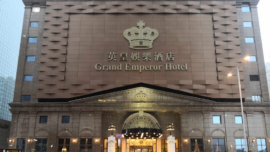The Chinese government wants the Macau gaming industry to grow at a rate closer to its economy and is targeting a 10 per cent annual rate as the ‘new normal’, a Wells Fargo report says. The new guideline from Beijing means that recent measures launched here like visa restrictions, UnionPay regulations and table limits are here to stay and will not go away, the US bank maintains.
The Chinese government is keen to not let Macau expand too fast – as it did in 2013 – and will allow the city’s gaming industry to grow per year with a margin of only a few percentage points above that of the Mainland economy. China is expected to expand at a 6 to 7 per cent rate in the next few years.
‘Macau gaming is entering a new normal of tighter policy and more moderate forward growth’ is the main conclusion of the 2015 Wells Fargo annual report on the city and the fourth edition since 2012: ‘Tighter policy setting likely keeps market growth limited to 10 per cent’, the document says, adding that as the Chinese customer comprises 95 per cent of Macau gaming revenues the market will likely adjust to Beijing’s influence, the document says.
Follow the leader
And the first one to adapt – or adopt – to the new line of thought from Xi Jinping regarding the local gaming sector is the MSAR Government, it transpires: ‘We believe the Macau Government has embraced the ‘new normal’ environment, evidenced by the changes in government leadership and a tough stance on smoking, dealer labor, and gaming tables’.
If the information collected by the US bank is correct and becomes a reality, this means that all the big six gaming operators here will have to review their long term plans. Most of the analysts were predicting that when the new wave of ten integrated resorts casinos came online in 2017, annual revenues would go up by 15 to 17 per cent. Not 10 per cent.
But the new demands from Beijing will jar with industry forecasts made when companies decided to invest in Cotai 2.0. Wells Fargo warns that for 2016 and 2017, the casino revenues here have to increase at least 10 per cent per year to absorb the new supply, mainly the six biggest properties like Sands’ Parisian, Wynn Palace or Melco’s Studio City. ‘Generally, low conviction over the timing, number of gaming tables and return of the new properties in Cotai creates additional uncertainty around the market outlook’, Wells Fargo analysts wrote. This will force the industry here to manage a very thin line between profitability and Beijing’s wishes.
Postponed success
With a lower growth rate for the upcoming years, the famous long term secular success history of Macau that every operator, official or investor likes to use when describing the city, is still on, but will take longer. Wells Fargo estimates that with an annual 10 per cent growth, the Macau gaming industry will only become a US$100 billion market in 2025 and not in 2020 as previously predicted.
The US bank assumes it is taking a more conservative approach to the city’s future warning that forecasts here could easily change. ‘As always with Macau, nothing is static and transparency is low’, says Wells Fargo.
For the near-term, the Wells Fargo outlook is less optimistic than that of its peers. The US bank expects revenues to decrease this year by 12 per cent, being one of the first investors to predict a double-digit drop in 2015. As the market estimates a recovery of casino operations in the second half of 2015, Wells Fargo notes that ‘few point to hard evidence as to why growth will resume, besides easy comparisons’.
Describing the second leg of this year as a ‘stabilisation’, the gaming revenues rebound is expected to be driven by the VIP segment due to additional junket capital from the two new properties opening this year (Galaxy Phase II and Studio City). ‘We expect the mass market to grow from the two new openings but expect same-store mass revenue to remain relatively flat’, the report says.
But unlike the previous crises in the Macau gaming industry, in 2009 and 2013, the recovery this year will not be as fast or as strong because it is ‘very unlikely’ that Beijing will underwrite another huge economic and fiscal stimulus in the economy as it did in the past: a move that drove a ‘hairpin-like’ rebound led by VIP gamblers.
New normal
For gaming stocks, the ‘new normal’ will put prices in a correction mode with investors revising down expectations: Expect stocks to remain range-bound this year as estimates and valuations adjust to the ‘new normal’. Wells Fargo stresses that significant overhangs and uncertainty over long-term growth could keep incremental buyers on the sidelines while valuations are not quite ‘washed out’ enough for value investors.
The US bank says that positive drivers for the gaming industry still exist in Macau for 2015 but ‘need to be sustained’. These include stabilisation signs of gaming revenues, the improvement of credit growth, the support for a second-half recovery by local government, the new liquidity generated by the two new casinos and the likely rebound of stocks prior to Studio City and Galaxy opening.























